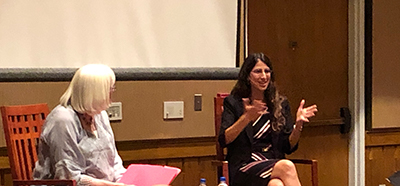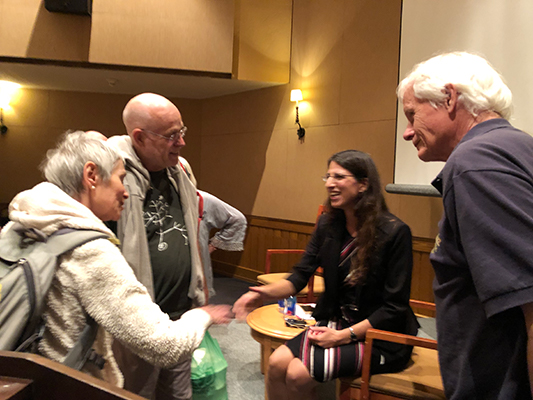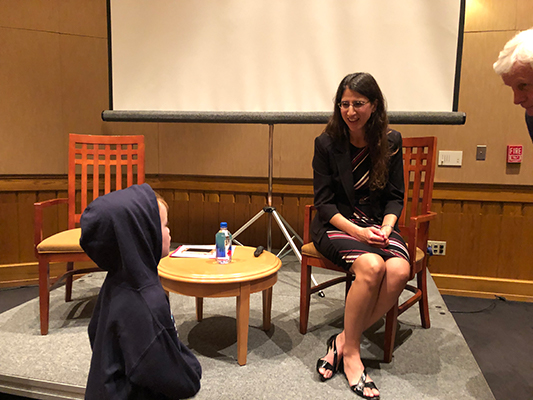Aylin Rodan Presents "What Flies Can Teach Us About Our Kidneys" at Telluride Science Town Talks
On Tuesday, July 30, Dr. Aylin Rodan, assistant professor in the Division of Nephrology & Hypertension, presented at Telluride Science Town Talks in Telluride, Colorado. This scientific talk, sponsored by the Telluride Science Research Center, provides the community of Telluride with an opportunity to hear about scientific topics related to molecular science, nanotechnology, biomedical research, energy, materials, and the environment.
Rodan’s talk, which was the last of the six-week summer schedule, was titled “What Flies Can Teach Us About Our Kidneys.” Judy Muller, an Emmy, DuPont-Columbia, and Peabody Award-winning television correspondent and National Public Radio commentator, moderated the discussion. The abstract of Rodan’s talk can be found below.

After the talk, there was a question and answer session where the community could ask a very broad range of questions. There were several questions about genetics, such as “Is there an Irish drinking gene?” and how genetics can be used to study kidney disease. “I responded by telling the audience about the fantastic resources we have in Utah to study genetic diseases,” says Rodan, “such as the Utah Population Database, and the work of my colleague, Dr. Marcus Pezzolesi, who is using those resources to identify genes underlying diabetic kidney disease.”
There were also questions directly about the kidney and its functions: How much water should we drink every day? Can we drink too much water? Why do we crave salt and how do our bodies taste salt?
“A very cute five-year old came up to me and asked about the different eye colors of different insects,” Rodan says, recalling one of her favorite questions during the Q&A session. “It was great to talk to members of the community to generate interest in science and increase awareness of what scientific researchers can do." 
Abstract
The kidneys play a central role in regulating homeostasis of water and ions – such as sodium, potassium and chloride – in our internal environment. Each day, we ingest and lose different amounts of ions and water. For example, we may eat a Big Mac containing a lot of sodium chloride (“salt”), or run a marathon on a hot day and lose ions and water through sweat. Our kidney responds by changing the amount of ions and water it reabsorbs or excretes in the urine. How does the body know whether we’ve eaten a Big Mac or run a marathon, and how is this information conveyed to the ion channels and transporters that allow the movement of ions and water? We are studying this problem using Drosophila melanogaster, the fruit fly, as a model. Fruit flies have been intensively studied for over a century, and powerful genetic tools have been developed to manipulate fruit fly genes. We can combine these genetic tools with physiological techniques to study ion and water movement in the fly renal epithelium, the Malpighian tubule. We have found that some of the same pathways that regulate ion transport in the mammalian kidney, also regulate ion transport in the fly kidney. We are using the fly to understand more about these pathways, and to illuminate the roles of genes underlying human kidney function. 
About Dr. Aylin Rodan
Dr. Rodan received her undergraduate degree in Biology from Yale University. She then completed MD/PhD training in the Medical Scientist Training Program at the University of California San Francisco, followed by Internal Medicine residency at UCSF. She completed a postdoctoral fellowship and nephrology subspecialty training at the University of Texas Southwestern Medical Center, where she remained on faculty for five years prior to coming to the University of Utah. Dr. Rodan is a general nephrologist specializing in disorders of the kidney, electrolytes and high blood pressure. She oversees Nephrology Fellows in training in the outpatient and inpatient settings.